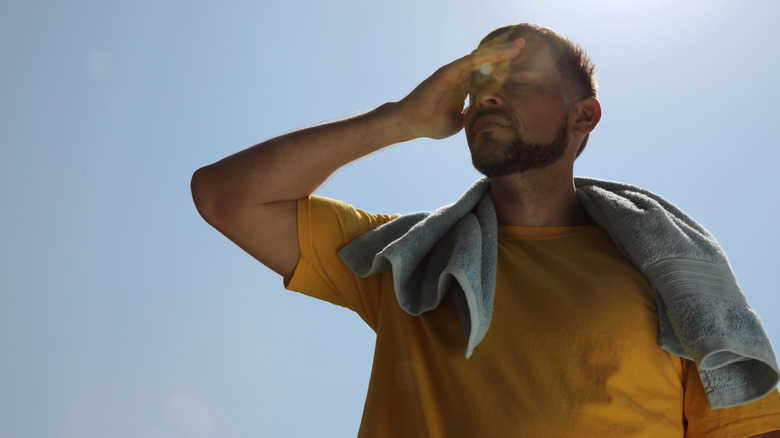Here's What It Really Means When Your Head Feels Hot
It can be concerning when your head feels hot, but there are many potential reasons this can happen. It could be a sign of a fever or it could simply be due to warmer weather or dehydration. In most cases, a hot head shouldn't be too concerning. If you have a fever, your whole body will feel warm, not just your head. You may also have other symptoms like a sore throat, chills, or sweating (via Mayo Clinic). If you think you might have a fever, take your temperature with a thermometer. A reading of 100 degrees Fahrenheit or higher indicates a fever.
Sometimes, feeling hot is simply due to the temperature outside. If it's warm out and you're sweating more than usual, this can lead to feeling heat all over your body, including your head. Drink plenty of fluids and stay in the shade or indoors to cool down.
According to Today, dehydration can also cause your head to feel hot. When you're dehydrated, your body doesn't have enough water to sweat properly. This can lead to a build-up of heat, which can make your head feel warmer than usual. Be sure to drink plenty of fluids during hot weather or when you're exercising. If you're concerned about feeling hot all over or if your head feels hot and you have other symptoms like a headache or dizziness, see a doctor.
When a hot head is a major cause of concern
While things like a fever, hot weather, and dehydration can all be treated quickly, there are more serious conditions that can be harder to take care of. If your head feels hot, there is a chance you are experiencing heat stroke. Heat stroke can be defined as a condition caused by exposure to high temperatures, or from strenuous physical activity in hot weather (via Johns Hopkins Medicine). Other symptoms include a throbbing headache, confusion, and dizziness. If you are experiencing any of these symptoms, it is important to seek medical attention immediately.
There are two types of heat stroke: exertional and non-exertional. Exertional heat stroke occurs when someone is participating in strenuous activity in hot weather. Non-exertional heat stroke happens when people are exposed to high temperatures without any physical activity. Elderly people, young children, and those with chronic medical conditions are more susceptible to non-exertional heat stroke (via WebMD). It is important to be aware of the symptoms of heat stroke, as it can be a dangerous condition. If you think you or someone you know may be suffering from heat stroke, see a doctor right away. Heat stroke can be fatal if not treated promptly.


